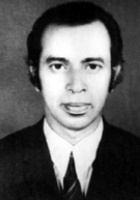Humayun Kabir
Humayun Kabir Poems
Humayun Kabir Biography
Humayun Zahiruddin Amir-i Kabir or Humayun Kabir was an Indian educationist, politician, writer and philosopher. Kabir was born on 22 February 1898 in Komarpur village near nangta para district town of Faridpur, currently in Bangladesh. His father, Khan Bahadur Kabiruddin Ahmed, was a Deputy Magistrate in Bengal and a forward looking man. He came first, with star marks, in his matriculation examination in 1922. He was educated at Presidency College, Calcutta, completing his Intermediate in Arts (I.A.) in English with first class third, and Calcutta University, where he completed his B.A. (Honours) and M.A. in English with first class first. He won a scholarship to Exeter College, Oxford where he completed his degree in 'Modern Greats', i.e. Philosophy, Political Science, and Economics with a first class in 1931. In 1932, he was invited by Sarvapalli Radhakrishnan to join as a lecturer at the newly established Andhra University. Later, he was a Joint Education Adviser, Education Secretary and then Chairman of the University Grants Commission in Delhi. He was the Minister of State for Civil Aviation, Education Minister of India twice, under the Prime Ministerships of Jawaharlal Nehru and Lal Bahadur Shastri. He was also Scientific Research and Cultural Affairs Minister. In 1965, Indira Gandhi offered him the Madras Governor's post, which he declined. From 1956-62, he was a member of the Rajya Sabha and from 1962-69 he was a member of the Lok Sabha, representing Basirhat constituency in West Bengal. Kabir was the editor of Maulana Abul Kalam Azad's biography India Wins Freedom. Maulana Azad dictated his biography to him in Urdu, which Kabir translated in English. He was one of the co-drafter of the UNESCO 1950 statement titled The Race Question. His daughter Leila Kabir is married to Indian politician George Fernandes. His nephew Altamas Kabir was the 39th Chief Justice of India (CJI) and his niece Shukla Kabir Sinha is a judge of the Calcutta High Court. Major works Imanuel Kant (1936) Sharat Sahityer Multattva (The main theory of the literature of Sharat Chandra Chattopadhyay) (1942) Banglar Kavya (The poetry of Bengal) (1945) Marxbad (Marxism) (1951) Mirza Abu Talib Khan (1961) Poetry, Monads and Society (1941) Muslim Politics in Bengal (1943) Rabindranath Tagore (1945) Men and Rivers Svapnasadh Sathi Ashtadashi Nadi O Nari)
The Best Poem Of Humayun Kabir
Partings
Those who stood close to you and were dear-
You will forget them in the flow of time, my friend,
Life's uneven road curves in and out
And suddenly they disappear beyond the bend-
Disappear as suddenly as first appeared.
Perhaps the darkness of the night swallowed them
While you came marching across the night.
Those who were once dear are today
Only faint memories of the mind:
Bodiless and immaterial phantoms of the heart.
The feeling dead leaves dry and rotting bones
But love cannot live on fond regrets.
If old love has now become a shadow of the past
Better dark oblivion hide it in darker shades.

I am poem lover